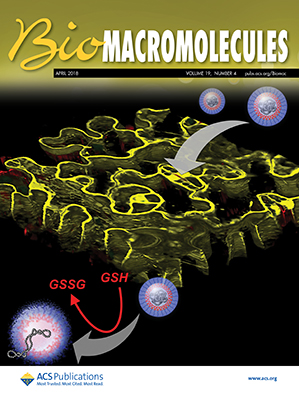混合碳水化合物和奎宁为基础的聚合物赋予胶体稳定性,提高性能,和mRNA传递的细胞特异性。
IF 5.4
2区 化学
Q1 BIOCHEMISTRY & MOLECULAR BIOLOGY
引用次数: 0
摘要
奎宁基聚合物已显示出有效递送核酸的希望;然而,奎宁的疏水性经常导致配合物不受控制的聚集(bbb1000nm)。聚乙二醇化常用于提高核酸递送载体的胶体稳定性;然而,这经常导致细胞内化减少。本文中,我们描述了两种二嵌段奎宁聚合物的合成,它们利用碳水化合物葡萄糖和半乳糖代替PEG作为中性亲水性嵌段来传递mRNA。这些二嵌段稳定剂与五种疏水性奎宁聚合物以不同的混合比例混合,产生73种配方库,其中47种产生亚微米颗粒。生物物理特性,如颗粒大小和mRNA结合,可以通过改变混合物的成分和比例来调节。我们的研究结果表明,下一代含糖稳定剂优于聚乙二醇化类似物,促进更大的细胞内化,改善转染,并具有细胞特异性的潜力。本文章由计算机程序翻译,如有差异,请以英文原文为准。

Blending Carbohydrate and Quinine-Based Polymers Imparts Colloidal Stability, Improved Performance, and Cell Specificity for mRNA Delivery
Quinine-based polymers have shown promise for effective delivery of nucleic acids; however, quinine’s hydrophobicity has often resulted in uncontrolled aggregation (>1000 nm) of complexes. PEGylation is often used to improve the colloidal stability of nucleic acid delivery vehicles; however, this frequently results in reduced cellular internalization. Herein, we describe the synthesis of two diblock quinine polymers that utilize the carbohydrates glucose and galactose in place of PEG as the neutral hydrophilic block to deliver mRNA. These diblock stabilizers were blended with five hydrophobic quinine polymers at several mixing ratios to generate a library of 73 formulations, 47 of which produced submicron particles. The biophysical properties, such as particle size and mRNA binding, can be tuned by varying the mixture components and ratio. Our results show that the next generation, sugar-containing stabilizers outperformed PEGylated analogs, promoting greater cellular internalization, improved transfection, and potential for cell specificity.
- Download: Download high-res image (87KB)
- Download: Download full-size image
求助全文
通过发布文献求助,成功后即可免费获取论文全文。
去求助
来源期刊

Biomacromolecules
化学-高分子科学
CiteScore
10.60
自引率
4.80%
发文量
417
审稿时长
1.6 months
期刊介绍:
Biomacromolecules is a leading forum for the dissemination of cutting-edge research at the interface of polymer science and biology. Submissions to Biomacromolecules should contain strong elements of innovation in terms of macromolecular design, synthesis and characterization, or in the application of polymer materials to biology and medicine.
Topics covered by Biomacromolecules include, but are not exclusively limited to: sustainable polymers, polymers based on natural and renewable resources, degradable polymers, polymer conjugates, polymeric drugs, polymers in biocatalysis, biomacromolecular assembly, biomimetic polymers, polymer-biomineral hybrids, biomimetic-polymer processing, polymer recycling, bioactive polymer surfaces, original polymer design for biomedical applications such as immunotherapy, drug delivery, gene delivery, antimicrobial applications, diagnostic imaging and biosensing, polymers in tissue engineering and regenerative medicine, polymeric scaffolds and hydrogels for cell culture and delivery.
 求助内容:
求助内容: 应助结果提醒方式:
应助结果提醒方式:


